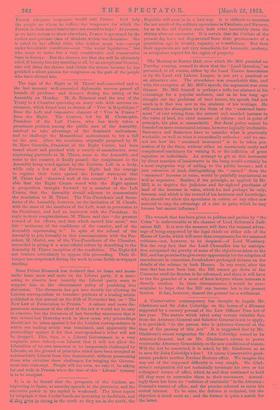The Meeting at Exeter Hall, over which Mr. Mill presided
on Tuesday evening, seemed to show that the " Land Question," as presented, at all events, either by the Land Tenure Association or by the Land and Labour League, is not yet a practical or an attractive one. The attendance was remarkably thin, and with the exception of Mr. Mill's speech, the argument was even thinner. Mr. Mill himself is perhaps a trifle too abstract in his- reasonings for a popular audience, and as he has long ago thought out the problems of land tenure, his speech had not much in it that was new to the students of his writings. He still makes the absorption by the State of the " unearned incre- ment " of rent arising from the natural and unaided increase in the value of land, his chief measure of reform ; and in point of principle, his plan is unassailable. But fiscal policy cannot be founded on mere economical axioms, however logically irrefutable.. Statesmen and financiers have to consider what is practically workable, as well as what is scientifically orthodox ; and we can- not see how the " unearned increment " is to be taken pos- session of by the State, without either an enormously costly and complicated machinery for valuing it, or the infliction of great injustice on individuals. An attempt to get at this increment by direct taxation of landowners in the lump would certainly be a most unpopular way of adding to the public income ; and a just valuation of land, distinguishing the " earned " from the "unearned" increase in value, would be painfully inquisitorial as- well as expensive. Besides, if the principle, as applied by Mr. Mill, is to deprive the judicious and far-sighted purchaser of land of the increase in value, which he, and perhaps he only, foresees, and which is the reward of his keenness and knowledge, why should we allow the speculator in cotton or any other raw material to reap the advantage of a rise in price which he may foresee but cannot influence?


































 Previous page
Previous page